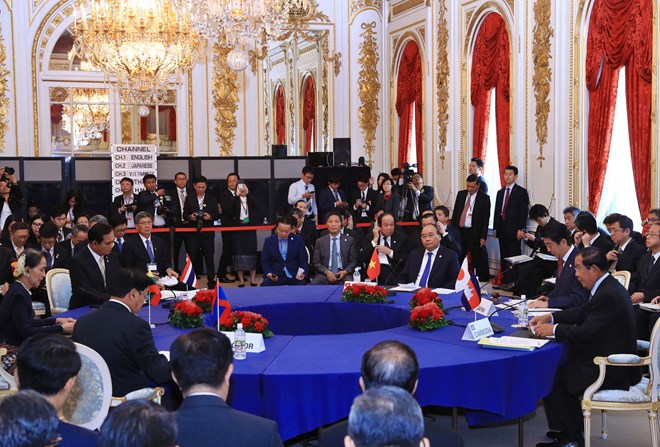



The 10th Mekong-Japan Summit Meeting takes place in Tokyo on
October 9 (Photo: VNA)
The event, chaired by Japanese Prime Minister Shinzo Abe, was attended by
Vietnamese PM Nguyen Xuan Phuc, Cambodian PM Hun Sen, Lao PM Thongloun
Sisoulith, Thai PM Prayut Chan-o-cha, and Myanmar State Counsellor Aung San Suu
Kyi.
The leaders reviewed cooperation over the past years, discussed major
orientations for cooperation in the time ahead, and exchanged views on some
international and regional issues.
They shared the view that 10 years since its foundation, Mekong-Japan
cooperation has recorded many achievements in line with the set directions
which are building a Mekong region of long-term peace and stability; developing
economy and actively contributing to ASEAN integration; and sustainable
development through regular high-level meetings, discussions on cooperation at
all levels, and implementation of concrete projects in specialised fields in
each period.
Regarding the New Tokyo Strategy 2015 for 2016-2018, they welcomed the
implementation of hundreds of projects in multiple areas, helping to improve
infrastructure connectivity and promote economic – industrial cohesion and
people-to-people exchange between Japan and the Mekong region.
The Mekong leaders appreciated Japan’s provision of over 750 billion JPY in
assistance for 2016-2018.
Agreeing to lift Mekong-Japan cooperation to the strategic partnership, the two
sides said cooperation in the time ahead will focus on three main pillars,
namely vibrant and effective connectivity, people-centred society, and
cooperation in health care, education and justice.
The summit agreed to organise the Mekong-Japan Exchange Year 2019 to enhance
understanding and exchange among people of the Mekong countries and Japan. They
also agreed to realise a "green Mekong”, focusing on fostering collaboration
with international and regional organisations, especially the Mekong River
Commission, in managing and sustainably using Mekong water resources. The
countries will work together to cope with climate change; reduce, treat and
recycle waste; and preserve and sustainably use fisheries resources.
At the event, the participants also talked about many global and regional
affairs, including the East Sea and Korean Peninsula issues. They reaffirmed
the common pledge to maintain and promote peace, security and stability in the
region, while resolving disputes by peaceful means, including fully respecting
legal and diplomatic processes and not threatening or using force, in
accordance with widely recognised principles of international law, including
the 1982 United Nations Convention on the Law of the Sea (UNCLOS).
Speaking at the meeting, PM Phuc emphasised the role of and contributions by Mekong-Japan
cooperation to the realisation of the ASEAN Community Vision 2025 and to
regional peace, stability and development. Mekong-Japan cooperation projects
have helped give considerable changes to infrastructure, human resources
development and environmental protection in the Mekong nations.
He also affirmed Vietnam’s commitment to continuing to work closely with Japan
and other Mekong subregion members to promote cooperation.
Suggesting cooperation directions for the time ahead, the PM said the two sides
should step up transport connectivity, including Vientiane-Hanoi Expressway and
waterway transport between Vietnam and Cambodia, and energy connectivity within
the Mekong region as well as between the region and non-Mekong countries.
He suggested improving soft infrastructure connectivity, and building and
implementing agreements and coordination mechanisms on facilitating transport,
trade and digital connectivity among the member nations. The countries should
also boost industrial connectivity and prioritise the development of supporting
industries; increase people-to-people connectivity, especially through
education and training; and sign agreements on mutual recognition of vocational
training diplomas and certificates.
They also need to realise the joint vision on a green Mekong with a focus on
cooperation in sustainably managing water resources, protecting the
environment, responding to climate change, and developing smart and sustainable
agriculture, he added.
PM Phuc recommended a Mekong-Japan innovation network be set up to foster
connectivity and exchange among research, invention and startup centres of
Japan and the Mekong countries.
The summit high valued and reflected the Vietnamese leader’s proposals in its
documents.
In terms of global and regional issues, PM Phuc welcomed the positive outcomes
of the bilateral summits between the Democratic People’s Republic of Korea and
the US and the Republic of Korea. He voiced his support for the
denuclearisation in the whole Korean Peninsula in a peaceful manner and in line
with resolutions of the UN Security Council.
He asserted that Vietnam will keep coordinating with Japan and the
international community to solve humanitarian issues, including abduction,
condemning the kidnapping of citizens between countries.
With regard to the East Sea issue, he recognised some positive improvements in
negotiations but also voiced his concern over the fact that complex
developments remain in the waters. He stressed the urgency of ensuring peace,
stability, security, safety and freedom of navigation in and overflight over
the East Sea, calling for adherence to the 1982 UNCLOS, full and effective
implementation of the Declaration on the Conduct of Parties in the East Sea,
and soon finalisation of an efficient and effective Code of Conduct in the East
Sea.
At the end of the meeting, the leaders adopted the Tokyo Strategy 2018 for
Mekong-Japan Cooperation in the 2019-2021 period.
Source: VNA